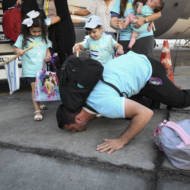
For thousands of years the Jewish People has not stopped yearning for a return to Zion. Today, we are once again sovereign in our homeland. Jews, come home!
By Rabbi Ari Enkin, Rabbinic Director, United with Israel
The Jewish People’s yearning and connection to the Land of Israel goes back to the very first Jew.
God appeared to Abraham in his native “Ur” (modern-day Iraq) and told him to pack up and head to the Land of Israel (Genesis 12:1). God promised Abraham that the Land of Israel would be given to him and his descendants. That’s where it all began. This why Jews of all stripes and colors, religious and secular, have always yearned for the Land of Israel.
As Zionist leader Nahum Sokolow wrote: “The Jews never forgot their old nationality. They never forgot that they were a nation apart, distinct in morality, in learning, in literature, in social arrangements and in agriculture; a civilized nation at a time when Western civilization was still unknown. For 2000 years after the loss of political independence, they believed with passionate intensity in their future as a nation in Palestine.”
The prophets promised and foresaw our return to the Land of Israel even after exile. As Isaiah told us “I will gather your descendants from the east and from the west. I will say to the north “give them up” and to the south “don’t keep them.” Bring my sons from far and my daughters from the ends of the earth.” (Isaiah 43:5-6).
The origin of the word ‘Zion’ is both mysterious and exciting. No one is quite sure of its origins. It is a word that has been used throughout Scripture to convey a “rock”, “stronghold”, “sign” or “marking.” It had a special meaning since the destruction of the First Temple in expressing the yearning of the Jewish people for its homeland. The word “Zion” appears approximately 150 times in the Bible. It is no surprise, therefore, that the name of the movement of return to the Land of Israel and establish a Jewish state is “Zionism”
The name ‘Zion’ was first used for the Jebusite fortress (known as “the stronghold of Zion”) that preceded the Holy Temple. Zion was also used as a synonym for the Temple Mount itself. Later, the word ‘Zion’ came to refer to Jerusalem, and eventually, the entirety of the Land of Israel. Recall the verse, “By the rivers of Babylon we sat and wept as we remembered Zion” (Ps. 137:1). So too, we say in our prayers, “And let our eyes behold Your return to Zion in mercy.”
In both these latter instances, ‘Zion’ refers to the entire Land of Israel. Zion is also used to refer to the spiritual side of Jerusalem, as it says, “For out of Zion goes forth the Torah and the word of God from Jerusalem” (Isa. 2:3).
The Jewish prayers are full of references to Zion and the return to the Land of Israel. In fact, Jews pray facing the Holy Land. The thrice-daily Shemone Esrei prayer contains many requests for the return to the Land of Israel. The Birkat Hamazon, Grace after Meals, includes numerous references to the Land of Israel. In fact, according to rabbinic literature, “anyone who does not mention the Land of Israel in the Grace after meals does not fulfill the commandment of saying it.”
There has not been a single day in the last 4000 years when Jews have not mentioned the Land of Israel. Indeed, “If I forget you, O Jerusalem, let my right hand go lame. Let my tongue cleave to the roof of my mouth if I do not remember you – If I do not set Jerusalem above my greatest joy” (Psalms 137:5-6).
There are many other rituals and customs that emphasize the importance of Zion in Jewish life. For example, synagogues are built so that when the congregation faces the Holy Ark, they will be facing Jerusalem. At a Jewish wedding, the groom “elevates Jerusalem above his foremost joy” by breaking a glass under the wedding canopy in order to recall the destruction of the Holy Temple. We have numerous fast days that are observed in order to remember the destruction of Jerusalem and the subsequent exile. There are 10 days a year in which Jews don’t eat meat or drink wine in order to remember Jerusalem. Every orthodox Jewish home has an area of a wall left unpainted to remember the destruction.
Let’s take a look at some of the sayings of the sages about the Land of Israel:
Whoever walks four steps in the Land of Israel is promised a share in the world to come.
The air of the Land of Israel makes one wise.
Even if there are righteous and wise people outside the Land of Israel, it is the simple folk inside the Land of Israel who are responsible for the nation.
The Holy One Blessed be He examined all the cities and did not find a city that was worthy of having the Sanctuary built within it except Jerusalem
The Holy One, Blessed be He, examined all the countries and did not find a country that was worthy of the people of Israel except the Land of Israel.
All blessings, consolations, revelations, salvation, support and greatness come from Zion.
Today we are living in an unprecedented era. We are once again sovereign in our homeland. The doors are open for Jews to come home. God wants the Jewish people here, “for to you have I given the land to possess it” (Numbers 33:50-53). The sages tell us “that living in the Land of Israel is equal to performing all the commandments in the Torah.”
For the love of Zion…. Come home!
JOIN ISRAEL’S MASSIVE SPRING PLANTING OF FRUIT TREES!
PLANT YOUR OWN FRUIT TREES IN ISRAEL TODAY!
Make the Land of Israel even more beautiful and fruitful while helping Israeli farmers to recover from financial losses due to coronavirus and destructive Hamas arson fires.
“…for the Lord your God is bringing you into a good land… a land of wheat and barley, vines, figs and pomegranates, a land of olive oil and honey”
(Deuteronomy 8:7-8)
Source: United with Israel

